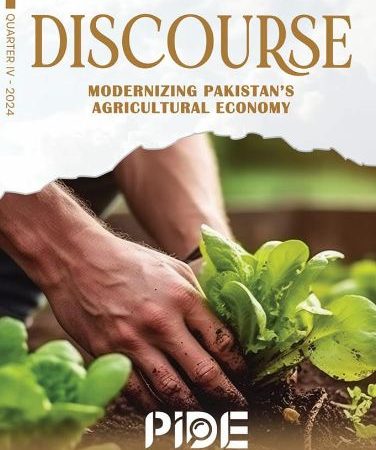PIDE’s discourse unveils urgent reforms for Pak’s future: Dr. Arshad Hashmi

ISLAMABAD, JAN 19 /DNA/ – The Pakistan Institute of Development Economics (PIDE) is proud to announce the release of its much-awaited edition of Discourse, titled Modernizing Pakistan’s Agricultural Economy. This special issue is a call to action for addressing the critical challenges facing the country’s agricultural sector through innovative solutions and global best practices. In his opening remarks, Dr. Arshad H. Hashmi, Acting Vice Chancellor of PIDE, stated, “This special issue of Discourse aims to inspire a transformational shift in Pakistan’s agricultural landscape, fostering informed discussions and actionable strategies to address the challenges of today and tomorrow.”
The issue was skillfully curated by editorial team, including Dr. Arshad H. Hashmi; Dr. Shujaat Farooq,; Dr. Abedullah Anjum; and Dr. Muhammad Faisal Ali, all from PIDE. Together, they have shaped a comprehensive guide to reforming and modernizing the agricultural sector.
The edition highlights the multifaceted challenges confronting Pakistan’s agricultural sector, including low productivity, fragmented landholdings, poor infrastructure, inefficient irrigation practices, and regulatory barriers. These issues are compounded by a lack of investment in research and development (R&D), outdated technologies, and the impacts of climate change. However, the publication outlines a roadmap to overcome these challenges by adopting global best practices, such as precision farming, deregulation of agricultural markets, geospatial monitoring, and leveraging advanced technologies like artificial intelligence (AI) and drones.
Among the solutions presented, the issue emphasizes the critical need for liberalizing input markets, such as seeds and fertilizers, and reforming land consolidation policies to promote equitable growth. It also advocates for economic water pricing to encourage sustainable use of resources while suggesting market-driven approaches to enhance efficiency in the sugar and wheat sectors. Additionally, adopting AI and drone technology in supply chains and farming practices is highlighted as a game-changer for improving productivity and reducing waste.
The special edition features compelling contributions from leading experts. Muhammad Faisal Ali and Abedullah propose actionable strategies in “Pathways to Prosperity: Strategic Reforms for Pakistan’s Agricultural Markets,” while Zartasha Inayat and Tuaha Adil explore the potential of deregulating the sugar sector in “Deregulation of the Sugar Sector Critical to Promote Efficiency.” Sobia Rose addresses the inequities in land markets in “Reforming Agricultural Land Markets in Pakistan: Overcoming Structural Inequities,” and Muhammad Asad ur Rehman Naseer examines pricing inefficiencies in “Decoding the Dynamics of Pricing in the Fruit and Vegetable Market: Highlighting the Government Imperfections.”
Technological innovation also takes center stage, with Ibrar ul Hassan Akhtar detailing geospatial advancements in “SUPARCO Interventions for Geospatial Monitoring of Agricultural Crops.” Anjeela Khurram and Muhammad Faisal Ali emphasize energy efficiency in “Valuing Energy Efficiency Potential in the Agriculture Sector,” while Rizwan Mir, outlines government-led efforts in “Revolutionizing the Agricultural Sector of Pakistan – SIFC’s Top Priority.” Ayesha Sultana’s “Why Investment in R&D has not Improved Agriculture Productivity?” critiques the barriers to impactful research in the sector.
The potential of AI is explored in a series of articles, including “Artificial Intelligence (AI) for Agricultural Advancements” by Shayan Malik and “Harnessing AI for Agricultural Transformation–A Prospect of Pakistan” by Engineer Mahwish Rose. These contributions illustrate how AI can revolutionize supply chains, precision farming, and resource management. Similarly, the role of drone technology in improving efficiency and overcoming regulatory constraints is examined in articles by Sadaf Safder and Hafsa Sarfraz.
The edition also explores the future of Pakistan’s agricultural sector, with a focus on the Gene Revolution. Articles such as “Sowing the Seeds of Change: Pakistan’s Transition from Green to Gene” by Ayesha Rahman and “Moving from Green to Gene Revolution: Scope and Challenges for Pakistan” by Waqar Younas & Uzma Zia advocate for the adoption of genetically modified crops to enhance productivity and sustainability.
The comprehensive analysis and actionable solutions presented in Discourse aim to provide a roadmap for policymakers, stakeholders, and innovators to collaborate on building a resilient agricultural sector. With its focus on adopting global best practices and modern technologies, this special edition offers a vision for transforming Pakistan’s agricultural landscape.
Related News
Rana Mashhood Meets Italian Ambassador Armellin
Rana Mashhood, Italy’s Ambassador Armellini Discuss Trade, Education, Legal Labor Mobility and Youth Cooperation toRead More

Ramadan moon sighted in Pakistan, fasting starts today
ISLAMABAD, FEB 19: Pakistan begins the first fast of Ramadan 2026 today (Thursday), following theRead More


Comments are Closed